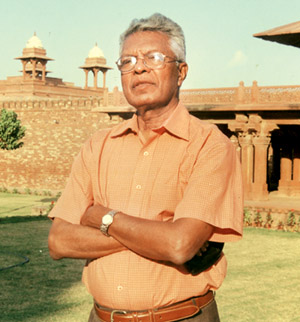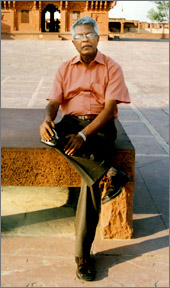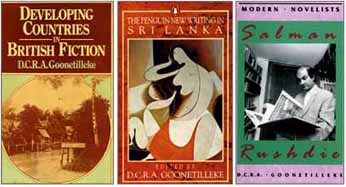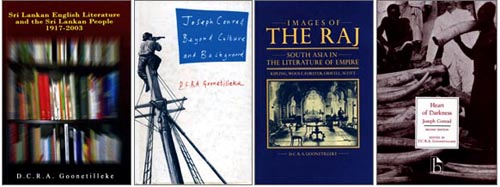Evolving, revolving retired life
In an exclusive interview Professor D.C.R.A Goonetilleke talks
about, probably the best phase in anybody's life - the second
renaissance - retirement
by Aditha Dissanayake
|

“I have devoted myself full time to reading and writing.”
Professor D.C.R A Goonetilleke
|
 Idle? No! This is probably one word you will never pin on Professor
D.C.R A Goonetilleke. Accomplished? Certainly. Recognized in the west as
a well established critic of "20th century and Post Colonial
Literature"? Without question. Idle? No! This is probably one word you will never pin on Professor
D.C.R A Goonetilleke. Accomplished? Certainly. Recognized in the west as
a well established critic of "20th century and Post Colonial
Literature"? Without question.
The champion of the Sri Lankan English writers in the international
literary arena? Definitely. Once his fourth book is completed, a world
authority on Joseph Conrad?
Unarguably. But idle? No way. At sixty-eight, having just completed
editing one more anthology of Sri Lankan literature in English with
several more books introducing prime literature to readers, to be
published later on in the year, Professor Goonetilleke says "I have
retired from teaching, but not retired from my scholarly pursuits".
Sound and vision, on Tuesday morning, as I sit listening to him in
the cool ambience of his home, transcends me back to my undergraduate
days where I had sat alone in the lecture rooms, listening to that same
voice instilling in me, from the first lecture on Conrad's Heart of
Darkness to the last, Sydney's Defence of Poesie", an unending
enthusiasm for all the facets of literature, and the first criterion of
a scholar; that any book of any size or colour or date be considered an
avenue to some great adventure.
Today, more than a decade later, having left the spiritual haven of
undergraduate days and entered the main stream of life earning my bread
and butter as a writer, I find his natural, unaffected personality makes
discussion easy specially when he agrees we both have a job to do -
mine, to ask questions, his, to answer them.
It is hard not to wonder what life must be like after having spent
forty-four years as a lecturer, most of them as the Head of the
Department of English, at the University of Kelaniya; having nurtured an
uncountable number of students, marked ever so many tutorials,
dissertations, exam papers spanning from 1961 to 2004, to realize the
years ahead from now on will be entirely free from the strains of a
lecturer's life.
|

Life after retirement |
"Now that I am not engaged in employment I have devoted myself full
time to reading and writing." says Professor Goonetilleke. "The joy of
not being employed is, now I can do my scholarly work without undue
pressure. Now I can choose the areas where I would like to make a
contribution, to literature internationally and nationally".
Having already published three books on Joseph Conrad Professor
Goonetilleke says he would like to write a fourth study on Conrad
because he would love to become a world authority on the Polish writer.
Answering the question why Conrad is his "pet" (in much the same way
Conrad called his book Heart of Darkness, "my pet Heart of Darkness) he
says "Conrad is different from the normal British writers and many
cultures have contributed to the making of his work;Asian, Latin
American, European."
English was a foreign language to Conrad in much the same way it is a
foreign language to us, Sri Lankans, and Conrad can be seen as an
example of how a writer whose mother tongue is not English and who has
not had a sophisticated education can yet "achieve much if he has the
will".
He also sees Conrad as a challenge because Conrad is considered a
difficult writer by many critics.
Apart from his work on Conrad, Professor Goonetilleke is also hailed
as the first scholar to write about Raj literature from its origins in
Elizabethan times to the present in Images of the Raj.
Concentrating on the best literature; Kipling, Leonard Woolf, E.M
Foster, George Orwell and Paul Scott he shows how this literature
besides embodying the major British reactions to the Raj (words like
"Why the kindest thing one can do to a native is to let him die" said by
Mrs. Callendar in E.M Forster's A Passage to India...) represents
different periods in its evolution and in British thinking.
 In his book "Developing Countries in British Fiction" he becomes the
first critic from a developing country to study extensively the British
reactions to these countries in the context of historical, political and
personal circumstances. In his book "Developing Countries in British Fiction" he becomes the
first critic from a developing country to study extensively the British
reactions to these countries in the context of historical, political and
personal circumstances.
He faces unflinchingly issues of imperialism, race relations and
primitivism raised by these literature and provides a work significant
to readers of both developed and developing countries.
Yet, the greatest contribution Professor Goonetilleke has made
through his work is unarguably to his own country, by introducing the
work of many Sri Lankan writers to readers world wide through six
anthologies.
He was the first to edit an anthology of Sri Lankan literature in all
three languages - Sinhalese, Tamil and English thus dispelling the
belief Sri Lankan literature is merely an extension of the literature of
India and is therefore, of little consequence.
 In his latest book Sri Lankan English Literature and the Sri Lankan
People 1917-2003 he provides the most comprehensive study of Sri Lanka's
English literature to date. Taking into account the literature before
Independence, but focusing centrally on the period after Independence,
he scrutinies Sri Lankan English literature in its widest sense,
covering works published not only in book form, but also in journals and
in newspapers. In his latest book Sri Lankan English Literature and the Sri Lankan
People 1917-2003 he provides the most comprehensive study of Sri Lanka's
English literature to date. Taking into account the literature before
Independence, but focusing centrally on the period after Independence,
he scrutinies Sri Lankan English literature in its widest sense,
covering works published not only in book form, but also in journals and
in newspapers.
Commenting on the contemporary Sri Lankan literature in English he
says the opportunities of producing literature in English is greater now
than before and the knowledge of English is more wide spread than in the
past.
He calls this the "democratization in the use of English" and
observes that "though the users of English are more in number the
quality of English is not the same as when it was spoken only by the
elite" but hopes that "the quality will improve in time and establish
itself.
Having won a stipendiary scholarship at Cambridge, an honour few
people have enjoyed and having had many opportunities to settle down in
a foreign country Professor Goonetilleke says despite all the
difficulties of living in Sri Lanka he feels Sri Lanka is his home and
no other society could offer the kind of satisfaction offered by the
society in his motherland.
He thinks " Whether the Sri Lankans abroad integrate with the society
around them is a debatable question". Today, he is content in all he has
achieved with his wife Chinchi, the perfect soul mate, who has always
given her unflagging cooperation and encouragement in helping him to
achieve all his endeavours.
A scholar, a critic, above all the champion of Sri Lankan English
literature, the nation's admiration for Professor D.C.R.A Goonetilleke
is infinite.
[email protected]
****
Citation from the State Literary Festival 2006
The title of Sahityaratne is awarded to D.C.R.A Goonetilleke,
Emeritus Professor of the University of Kelaniya in recognition of his
outstanding contributions in promoting Sri Lankan Literature in English
and his many foreign publications in the field of post-colonial studies.
He was elected World Chairperson, Association for Commonwealth
Literature and Language Studies (ACLALS) and organized its conference of
1995 which brought honour to the country.
He was Foundation Visiting Fellow at Clare hall, University of
Cambridge, a Fellow Commoner of Churchill College, University of
Cambridge and a Henry Charles Chapman Visiting Fellow, University of
London and Guest Professor of English at the University of Tubingen,
Germany. He holds a unique record in Sri Lanka as a productive
distinguished and tireless scholar.
His major works in English literature include Developing Countries in
British Fiction, acknowledged by international academia as a pioneering
step in post-colonial studies, Images of the Raj, South Asia in the
Literature of the Empire. Joseph Conrad; Beyond Culture and Background
and Salman Rushdie.
He has served his own country well by introducing the work of many
Sri Lankan writers to readers and scholars world-wide through six
anthologies. In Sri Lankan English Literature and the Sri Lankan People
1917-2003 he has provided a comprehensive contemporary history of Lanka
with an evaluation of Sri Lanka creative writing from its origins to the
present day.
These impressive achievements were attained parallel to forty four
years of imparting knowledge to students and serving on numerous
national committees on cultural activities and the teaching of English. |
